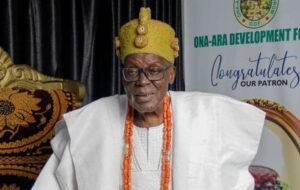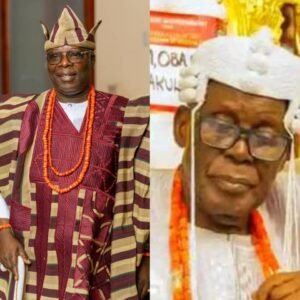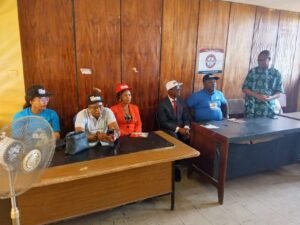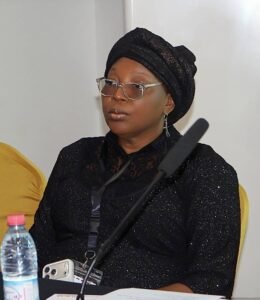Emir Sanusi and the Battle of Kwatarkwashi by Festus Adedayo

The duo of Abba Yusuf, governor of Kano State, and the Nigerian presidency stand the risk of plunging Kano back into the year 1893. Their weapon would be politics and votes of the over 2 million people of Kano. In the year 1893, in the words of highly rated scholar on Northern emirate administration, C. N. Ubah, a bitterly disputed succession battle plunged the Kano emirate into anarchy and civil war.
Indeed, the Kano royal family had overtime been a hotbed of divisions and acrimony. Beginning from the first civil war fought in Kano in 1565, the royal house of Kano had been bedeviled by internal strife and bloodshed. In 1648, the house was again ravaged by a second civil war shortly after the death of Muhammed Alwali, also known as El Kutumbi. The strife continued even till 1806 when Kano became part and parcel of the nascent Sokoto Caliphate. That year, followers of Usman dan Fodio forcefully drove out Alwali, Kano’s last Hausa emir, from the city. Thereafter, in 1807, after a protracted struggle with the Fula warriors towards the end of that year, Alwali was ambushed and assassinated at Burum-Burum in present day Kano. His assassination spelled the end of the Kutumbaw line of Hausa aristocrats in Kano, as well as the fall of the Bagauda dynasty that had been in place for 800 years.
In modern times, we have had peaceful enthronement and dethronement of Kano Emirs. For instance, one day in August, 1963, Sir Ahmadu Bello, the Sardauna of Sokoto, suddenly woke up from a belligerent side of his bed and conceived the sack of the Emir of Kano, Sir Muhammadu Sanusi. Persuaded that courtesy demanded he should inform his protégé and Prime Minister, Sir Abubakar Tafawa Balewa of this move, Bello sent to Lagos his friend, Alhaji Isa Kaita, Waziri of Katsina, then Northern Region Minister for Works and later, Minister of Education between 1957 and 1966.
There, Kaita met Balewa with his five ministers – Muhammadu Ribadu, Shehu Shagari, Zanna Bukar Dipcharima, Maitama Sule and Tudun Wada. When he broke the news, Balewa and the others were horrified and expressed their opposition to it. “Tell the Sardauna that he should not do it, for Kano will be on fire,” they chorused. Sanusi was a highly revered and loved monarch with a cultic following. Then Kaita rose and told the Prime Minister and the five ministers, “I am not here for permission. I am here to inform you that the Sardauna had made up his mind. I am afraid, no going back”. Bello and Balewa later agreed that Azare, headquarters of the Katagum Emirate in Northern Bauchi province, should be Sanusi’s banishment place. Two days after, Sanusi was dethroned and banished to Azare where he died in 1984.
Who will give Tinubu and Yusuff that initial counsel which Balewa and his ministers gave Ahmadu Bello? Who will tell them that, with the current weaponizing of politics and votes in the Kano royal house succession battle, in anticipation of the 2027 elections, “Kano will be on fire”?
Fifty seven years after that Ahmadu Bello dethronement of Sanusi, in the same off-handed and cavalier manner he removed him, Abubakar Ganduje also halted Sanusi Lamido Sanusi’s imperial ride on the royalty of Kano. Through the State Emirate Council Law 2019, Ganduje imposed a five-emirate system, birthing first-class emirs in Gaya, Rano, Karaye and Bichi. Thus, in 2020, Ganduje peremptorily removed Sanusi over allegation of insubordination to his government. And 61 years after, Governor Yusuf walked that same Ahmadu Bello route by removing the Emirs.
Aside Ganduje’s allegation of insubordination against Sanusi, the presidency of Muhammadu Buhari, too saw Sanusi’s cup as having run over. Security reports alleged that the Emir was tampering with the president’s meaty pie. Coupled with his perceived aristocratic obstinacy, relentless criticisms of the fiscal regime and indeed the administration of Buhari in very unflattering terms, Ganduje’s disdain for Sanusi received a presidential imprimatur. He had to go.
After receiving his letter of appointment from Yusuf on Friday, Sanusi, speaking in Hausa, ascribed his return to the palace as God’s inscrutable act, because God is “the all knowing. He gives power and takes away from people in leadership. If He gives, no one can take away and if He takes away, no one can stop Him. God gives power to whoever He chooses.” Earlier, while signing the new Kano Emirate Bill (2024) into law, Yusuf had said that the decision to return Sanusi to the stool as the 16th Emir of Kano was in the best interest of the state and its people.
Both Sanusi and Yusuf must however know that they were both being clever by half. The duo merely exploited and capitalized on the mass of the people’s uncritical appraisal of existential matters. Nigerians mix metaphysical issues with the issue of existence, to their disadvantage. The plot to bring the former Central Bank of Nigeria (CBN) governor back to the palace had no hand of God in it. It was a product of deft maneuvering by political gladiators playing a political chess game. Alongside the Sultan of Sokoto, Emir of Gwandu and the Shehu of Borno, in Nigeria and outside of its shores, the palace of the Emir of Kano is held in awe for its significance for both religious and political purposes.
Together, the four Emirs are historical and religious rulers who are literally deified in Northern Nigeria. On the national platform, whoever is the Kano Emir has a controlling leverage on the political barometer of the north. With Ganduje’s political hold on the state he governed withering and dithering, one permutation said the federal government needed an ally in a suave, likeable Sanusi whose preference also fits the political vendetta game that the Rabiu Musa Kwankwanso-led New Nigerian Peoples Party (NNPP) wanted to inflict on the APC national chairman. A Sanusi as Emir, with his adorable suavity and talismanic respect in the north would inch any government with sagging electoral hold like Tinubu’s back to power in a re-election contest. So they think. The other permutation said that Ganduje got the presidency of Tinubu to send military troops to Kano to thwart the removal of his anointed Emirs.
Though there are no artillery firepower and marching troops, today in Kano State, there seems to be a reenactment of the famous Battle of Kwatarkwashi. Last Thursday, Abba Yusuf appended his signature to the reappointment of Sanusi Lamido Sanusi as Emir of Kano, four years after his dethronement by his predecessor, Ganduje. By that singular act, perhaps unbeknown to Yusuf, he went down history lane among leaders of Kano who engaged in the politicization of successions in the Kano emirate.
Fought in 1903, the Battle of Kwatarkwashi ruptured Kano emirate peace. It was a decisive war between the British administered Protectorate of Northern Nigeria and the Emirate forces in the Sokoto Caliphate. In that battle, High Commissioner to the Northern Region, Lord Lugard, waged war against Kano Emir, Aliyu Babba. Bent on removing Babba for what he considered his arrogance and disregard for his office, Lugard wrote incriminating memos to Britain justifying military action against Babba. First, he claimed the Emir planned to attack the Kano garrison with 10,000 troops. Then, he alleged that Babba granted asylum to Dan Yamusa, the Magaji of Keffi, who, in October 1902, allegedly murdered a Captain Moloney, Keffi-based junior Resident. Lugard then placed a price and wanted tag on Yamusa’s head.
On January 29, 1903, the battle began. Colonel Morland, Commandant of Northern Nigeria Regiment and his troops rolled their battle tanks into Kano. Emir Babba’s cavalry for the battle was no match for Morland’s 24 Officers and 722 other ranks, with their four 75mm guns and 4 Maxims. The British, after breaking the walls of Kano, stormed the Emir’s palace, killed its defender, Sarkin Shanu, who had fought them with a sword, set the Emir’s arsenal on fire and killed not less than 300 of the warriors. On February 16, the British forces then proceeded to the Northwest of Kano where they ambushed the Kano cavalry who were gathered by the great rocks of Kwatarkwashi where a 6-hour firepower ensued. At the end, the Vizier of Kano emir beat a retreat with his remnant of cavalry, to Sokoto. Many of the fighters, under Muhammad Abbas, however, surrendered to the British, leading to Muhammad Abbas, Aliyu’s elder brother, being proclaimed Emir of Kano.
Unlike the Kwatarkwashi battle, change of Emirs in a very volatile emirate of Kano is usually in an off-handed manner. Alhaji Abubakar Rimi, Second Republic governor of Kano state from 1979 to 1983, had also toed same line in his removal of the Emir of Kano, Alhaji Ado Bayero. Rimi perhaps verbalized the disdain with which politicians regard Emirs. Speaking with respected veteran journalist, Lekan Alabi, in 1982 on an NTA Ibadan Personality Interview Programme, Speak Out, Rimi declared that traditional rulers were “mere public servants” and threatened to remove Bayero.
He exploded: “The way you press and our political opponents (regard) the Emir of Kano is not the way we regard him. As far as we are concerned (thumping his chest) – we the elected government of Kano state – as far as I, the governor of Kano state, is concerned – the Emir of Kano is nothing, nothing, nothing but a public person… he is holding a public office… being paid from public funds and whose appointment is at the pleasure of the governor of the state and who can be dismissed, removed interdicted, suspended if he commits an offence. And there is nothing unique about Ado Bayero, the Emir of Kano… believe me, if he commits any offence which will make it necessary for us to remove him, we will remove him and we will sleep soundly”.
Since the formation of Kano Emirate in 1805, two attempts have been made to split the emirate. Incidentally done by civilian governments, both attempts hung their reasons for the Emirs’ removal on the need to whittle down the powers of Emirs. Rimi was the first to create five emirates out of the Kano Emirate. A noticeable sour relationship had developed between Bayero and Rimi. In 1981, Rimi stopped the traditional homage usually paid by village heads to Bayero. So, on April 1, 1981, Rimi created four new emirates of Gaya, Rano, Dutse, and Auyo, excising some domains from Bayero’s emirate. On April 7, 1981, he also issued a “Query” to Bayero and in 1982, ordered the return of dethroned Emir Muhammadu Sanusi to Wudil in the state.
What is playing out in Kano today is a replay of the Second Republic Kano government-Emirate tango. Or the usual volatility of successions in the royal house in earlier centuries. Rimi, who became governor under the banner of the People’s Redemption Party (PRP) had fallen out with party leader, Mallam Aminu Kano. From this fallout came a faction of PRP called “Yan tabo” with its loyalty strictly to the Mallam. The other faction, called “Yan santsi,” pledged its loyalty to Rimi. Unfortunately for Rimi, the electoral umpire, FEDECO, pronounced its recognition of the Aminu Kano faction. This led Rimi to defect to the Nigerian People’s Party (NPP) where he vied for a second term in the 1983 elections. As soon as he tendered his letter of resignation as governor, the “Yan tabo” faction replaced him with his deputy, Abdu Dawakin Tofa but later fielded Sabo Aliyu Bakin Zuwo as governorship candidate. Zuwo defeated Rimi. On his assumption of office in 1983, the first thing Bakin Zuwo did was to reverse the creation of the four new emirates made by Rimi. The single emirate of Kano continued for thirty six years until 2019 when Ganduje again got it splintered.
Unbeknown to the generality of the people, though Governor Yusuf had, in campaigns for the office of the governor, vowed to “right wrongs” in the emirate, his “very bad” case at the appellate court must have given him and the Nigerian power apparatchik what lawyers call consensus ad idem on the restoration of Sanusi to the palace. In the permutations of what is happening in Kano, the one suggesting that the president is most likely running with the hare and hunting with the hound is almost the most fertile. Sanusi and the current Nigerian power levers have always been allies. Giving his return a presidential push would be a worthy favour to a friend who incidentally has become a proposed weapon for retention of power.
Events unfolding since Thursday have shown that politicians are gradually dragging Kano to the Battle of Kwatarkwashi, the slab of bloodshed. As I write this, there appears to be two Emirs on a single Kano emirate stool. Presidency officials themselves are split between Sanusi and Bayero. Security apparatuses are also torn apart in their loyalty to the two “Emirs”, with Yusuf threatening to arrest Bayero for allegedly sponsoring the bid to set Kano on fire. But, is the blood of Kano people worth the politics of 2027 and vendetta?









